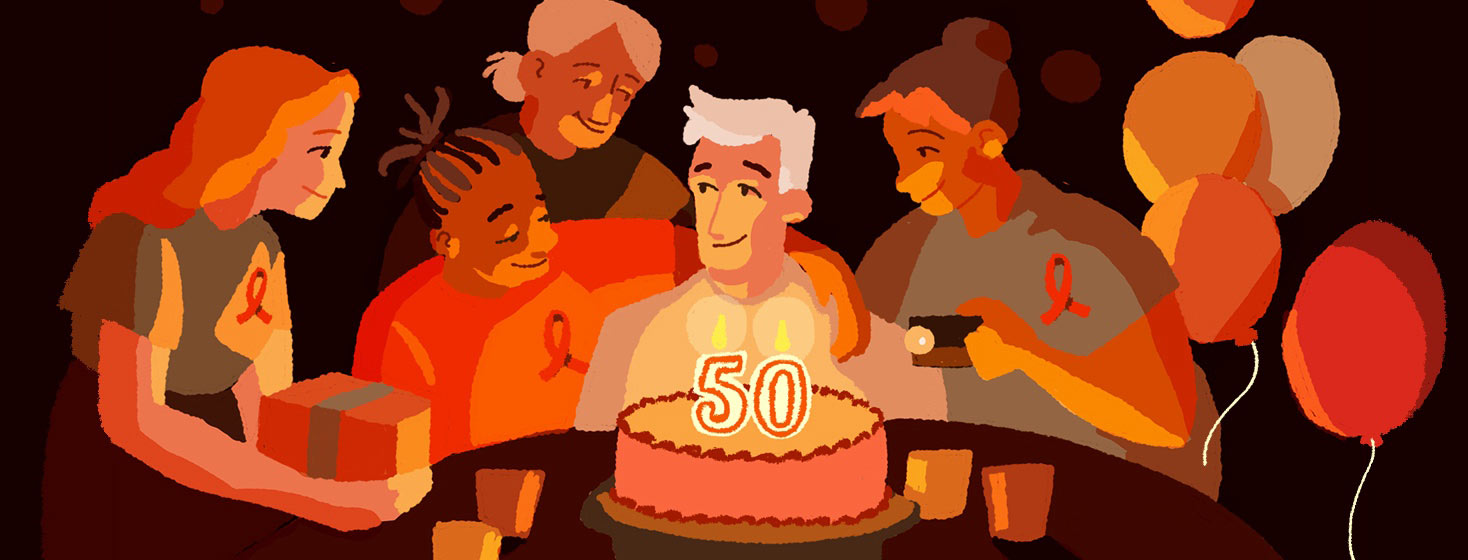What It Means to Get a Late-in-Life HIV Diagnosis
Like everything else in life, things weren't supposed to turn out this way. In 1995 I was told to get my affairs in order. The next thing I knew, the years had passed, the medicines had worked, and I was turning 50.
I have never been in the majority. My graduating class was one of the smallest. My generation is sandwiched between boomers and millennials. Even being Caucasian did not always count because I was openly gay.
Now my peers 50 and over are the largest group of people living with HIV in the United States.1
To keep me alive
To say I was unprepared is an understatement. Each treatment over the years brought its own set of problems that kept me alive but created health issues that put me at risk of death and disease from other quarters.
My fingertips are still numb from the first medicines I took 20-plus years ago. Every time I type a word, I'm reminded of the price I paid to get my viral load down.
I have fat pockets all over my body from early protease inhibitor use. This, in turn, has increased my cholesterol and put weight on me, which caused high blood pressure.
But I have learned to manage all these things. My doctor monitors my health with regular testing. I take my medicines. I exercise regularly and get enough rest. I make healthy choices about my diet and maintain positive relationships.
The hurt from the struggles
In the end, it brings me the one joy that matters more than anything else and wipes away the hurt from the struggles I have been through.
I'm alive and able to participate in my life.
This also allows me to be an advocate for aging with HIV. This year my thoughts are with people over 50 without a lifetime of experience living with the virus and who have recently been diagnosed with HIV.
Understanding the statistics
Seventeen percent of new HIV cases are in this 50-plus demographic. Some of these exposure incidents may have occurred after they turned 50. Others were exposed earlier in life and only recognized once symptoms became evident.2
Thirty-five percent of people 50 or older had late-stage HIV when diagnosed. This, along with co-morbidities associated with aging, creates challenges for survival.3
Adults and seniors are sexually active. And that's a good thing. It's ageist to think that older people do not have the same desires and needs as younger people. They may engage in risky behavior because they believe they have grown past the point of concern for HIV exposure.
They are not getting tested regularly. They may fear being isolated if they receive a positive result.
Some people report that symptoms of infection were mistaken for simply getting older. The fear of being stigmatized might keep them from discussing this with their doctor.
Featured Forum
View all responsesFor today and every day
For HIV and Aging Awareness Day this year, I will commit myself to sharing the 3 most important things I can do with my 50-plus peers each year.
1. Get tested
One of the first and most valuable lessons we learned in the fight against AIDS was that it's better to know than not. If you don't feel comfortable asking your PCP, try anonymous testing. There are even at-home kits available.
Do it regularly if you engage in sex without precautionary measures or if you are engaging in intravenous drug use. Knowing your status early will help you and your medical team be better prepared to help you navigate toward a long and healthy life.
2. Find a supportive medical professional
I know this is not an easy task, especially if the same family doctor has treated you for years. If they are not comfortable with your truth, they may not be the best person to treat you.
If it's an option for you, take your time and find the right person to take care of you. An early diagnosis can help you buy the time to do the work to get the right doctor.
3. Seek out support
Use the resources around you. The online world is full of spaces and publications to help you learn and understand what it means to be HIV-positive. There are also many online communities that you can be a part of. You are not alone.
If you have access to professional support, please use it. You do not have to face this by yourself.
I encourage everyone to reach out a helping hand and share their experience and knowledge with these newly diagnosed people. You may be the difference they need to survive and thrive into their golden years.
Support is so important when coping with a new HIV diagnosis. Share where you turned to support in the forums.

Join the conversation